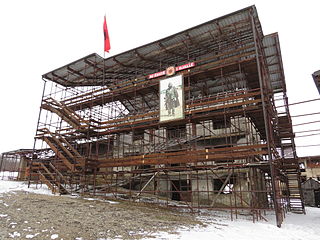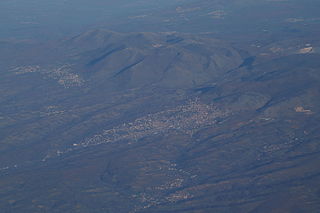
The Kosovo War was an armed conflict in Kosovo that lasted from 28 February 1998 until 11 June 1999. It was fought between the forces of the Federal Republic of Yugoslavia, which controlled Kosovo before the war, and the Kosovo Albanian separatist militia known as the Kosovo Liberation Army (KLA). The conflict ended when the North Atlantic Treaty Organization (NATO) intervened by beginning air strikes in March 1999 which resulted in Yugoslav forces withdrawing from Kosovo.

The Liberation Army of Preševo, Medveđa and Bujanovac was an Albanian militant insurgent group fighting for separation from the Federal Republic of Yugoslavia for three municipalities: Preševo, Medveđa, and Bujanovac, home to most of the Albanians in south Serbia, adjacent to Kosovo. Of the three municipalities, two have an ethnic Albanian majority, whilst Medveđa has a significant minority of them.

The National Liberation Army, also known as the Macedonian UÇK was an ethnic Albanian militant and separatist militia that operated in the Republic of Macedonia in 2001 and was closely associated with the Kosovo Liberation Army (KLA). Following the 2001 insurgency in Macedonia, it was disarmed through the Ohrid Framework Agreement, which gave greater rights and autonomy to the state's Macedonian Albanians.
The Račak massacre or Račak operation was the massacre of 45 Kosovo Albanians that took place in the village of Račak in central Kosovo in January 1999. The massacre was perpetrated by Serbian security forces in response to Albanian separatist activity in the region. The Serbian government refused to let a war crimes prosecutor visit the site, and maintained that the casualties were all members of the rebel Kosovo Liberation Army (KLA) killed in combat with state security forces.

Adem Jashari was one of the founders of the Kosovo Liberation Army (KLA), a Kosovo Albanian separatist militia which fought for the secession of Kosovo from the Federal Republic of Yugoslavia during the 1990s.
The Gornje Obrinje massacre refers to the killing of 21 Kosovo Albanians, belonging to the same family, in a forest outside the village of Donje Obrinje on 26 September 1998 by Serbian Police Forces during the Kosovo War. Among the victims were women and children.

The Suva Reka massacre refers to the mass murder of Kosovo Albanian civilians committed by Serbian police officers on 26 March 1999 in Suva Reka, Kosovo, during the 1999 NATO bombings of Yugoslavia.

The Attack on Prekaz, also known as the Prekaz massacre, was an operation led by the Special Anti-Terrorism Unit of Serbia which lasted from 5 to 7 March 1998, whose goal was to eliminate Kosovo Liberation Army (KLA) suspects and their families. During the operation, KLA leader Adem Jashari and his brother Hamëz were killed, along with nearly 60 other family members.

Numerous war crimes were committed by all sides during the Kosovo War, which lasted from 28 February 1998 until 11 June 1999. According to Human Rights Watch, the vast majority of abuses were attributable to the government of Slobodan Milošević, mainly perpetrated by the Serbian police, the Yugoslav army, and Serb paramilitary units. During the war, regime forces killed between 7,000–9,000 Kosovar Albanians, engaged in countless acts of rape, destroyed entire villages, and displaced nearly one million people. The Kosovo Liberation Army has also been implicated in atrocities, such as kidnappings and summary executions of civilians. Moreover, the NATO bombing campaign has been harshly criticized by human rights organizations and the Serbian government for causing roughly 500 civilian casualties.
The Meja massacre was the mass execution of at least 377 Kosovo Albanian civilians during the Kosovo War, which took place on 27 April 1999. Of the victims, 36 were under 18 years old. It was committed by Serbian police and Yugoslav Army forces in the Reka Operation which began after the killing of six Serbian policemen by the Kosovo Liberation Army (KLA). The executions occurred in the village of Meja near the town of Gjakova. The victims were pulled from refugee convoys at a checkpoint in Meja and their families were ordered to proceed to Albania. Men and boys were separated and then executed by the road. It is one of the largest massacres in the Kosovo War. Many of the bodies of the victims were found in the Batajnica mass graves. The International Criminal Tribunal for the former Yugoslavia has convicted several Serbian army and police officers for their involvement.

On December 14, 1998, the Yugoslav Army (VJ) ambushed a group of 140 Kosovo Liberation Army (KLA) militants attempting to smuggle weapons and supplies from their base in Albania into the Federal Republic of Yugoslavia. A five-hour battle ensued, ending with the deaths of 36 militants and the capture of a further nine. Dozens more fled back to Albania, abandoning large quantities of weapons and supplies, which the Yugoslav authorities subsequently seized. The ambush was the most serious war-related incident in Kosovo since a U.S.-negotiated truce took effect two months before. It came on the heels of increasing tensions in the province, where inter-ethnic violence had been escalating steadily since early 1995.

On the morning of April 23, 1998, a band of Kosovo Liberation Army (KLA) fighters was ambushed by a much smaller group of Yugoslav Army (VJ) border guards near the Košare outpost, just west of Dečani. The fighters had been trying to smuggle weapons and supplies into Kosovo via northern Albania. Nineteen were killed in the ensuing attack, and a further two were captured. The VJ did not sustain any casualties. Some of the militants retreated back to Albania, while others managed to break through the ambush and make it past the Yugoslav border, into Kosovo. Following the clash, the VJ confiscated a large quantity of arms that the militants had been transporting.
Timeline of the Kosovo War. Abbreviations:

The 2000 unrest in Kosovo was the result of the United Nations Interim Administration adopting Resolution 1244 on 10 June 1999. The unrest was fought between the Kosovo Force (KFOR), Kosovo Albanians, and Kosovo Serbs. It lasted somewhere from February 16, 2000 – June 6, 2000. An unknown number of Kosovo Albanians and Kosovo Serbs died along with an unknown number injured, while 1 Russian KFOR soldier died from shot wounds and UNMIK vehicles were burned during the unrest.

The attack on Orahovac was a 3-day long clash Between 17 and 20 July 1998 and was fought between the forces of the Kosovo Liberation Army (KLA) and the FR Yugoslavia. The KLA surrounded Serb villages intending to assert authority for the Kosovo Albanian provisional government through taking over a town and creating a corridor between KLA hotbed in Drenica and the Albanian border region. 8 KLA fighters and two Yugoslav police officers were killed, as well as five Serb civilians during the attack, while 85 Serb civilians were abducted by the KLA, 40 of whom are presumed to have been murdered. During the takeover of the town by Serbian special police, 79 Albanians civilians were executed.
Operation Fenix was an operation launched by militants of the KLA's "cobra" unit, which conducted two ambushes out of Albanian territory near the border outpost of Koshare on Yugoslav forces. Six Yugoslav Army personnel were killed. The KLA suffered no casualties, and captured Yugoslav ammunition, equipment and robbed the dead soldiers.
The Attacks on Likoshan and Qirez were large-scale police attacks that took place at the onset of the Kosovo War in the villages of Likoshan and Qirez.
The Meja ambush was an incident that occurred during the NATO bombing of Yugoslavia and the Kosovo War when members of the Kosovo Liberation Army (KLA) ambushed and killed five Serbian policemen and one officer on 21 April 1999 near Mejë, a village in Kosovo. The Serbian policemen were ambushed in a car on a road near the center of Mejë. One of the officers killed was police commander, Milutin Prašević. This ambush was used as a motive for the following Meja Massacre, that happened on 28 April of that year.
The Ambush near Kosovska Mitrovica was an incident that occurred on 8 January 1999, when members of the Kosovo Liberation Army (KLA) ambushed a Yugoslav Interior Ministry convoy carrying rations to troops stationed in a field near Kosovska Mitrovica. Later that evening, two columns of Yugoslav troops, accompanied with at least fifty tanks, set off in the direction of Kosovska Mitrovica. The Yugoslav troops told journalists that they were heading toward the area where the captive troops were thought to be held.
Operation Eagle was a military operation by the "Kobra Unit" of the Kosovo Liberation Army in the villages of Voksh and Sllup against Yugoslav forces. The engagement resulted in the deaths of six Yugoslav policemen and soldiers, meanwhile the KLA sufferred no casualties. The KLA also managed to capture Yugoslav ammunition and equipment, before withdrawing back to the Yugoslav-Albanian border.










